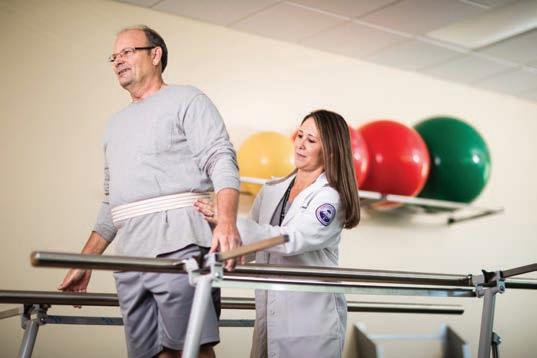
3 minute read
Midwestern University Arizona College of Osteopathic Medicine
by AOMA
Virtual Orientation Brings AZCOM Classes Together with Osteopathic Dignitaries
The practice of medicine is not wizardry, but that does not mean that Harry Potter’s world was bereft of good ideas.
Advertisement
Unlike the Houses of the Hogwarts School of Witchcraft and Wizardry, the Houses adopted by the Arizona College of Osteopathic Medicine were not designed to compete with each other; rather, they allow AZCOM students to enjoy the camaraderie, fellowship, and teamwork that a House can provide its members. Suggested by the students, faculty, and the Council of Student Government Presidents (COGSP), the AZCOM Houses allow students to stay connected with each other and with AZCOM students from other Classes.
As virtual orientation for the AZCOM Class of 2024 got underway prior to the start of the Fall term at Midwestern University, new students belonging to all of AZCOM’s Houses – named for various Doctors of Osteopathic Medicine – met together online with some of their House namesakes to discuss topics of importance to the Class and the osteopathic medical profession. Second-year students from each House also joined in, bringing the total attendance to over 500 students and faculty.
Members of Chaudhry House listened to Humayun “Hank” Chaudhry, DO, CEO of the Federation of State Medical Boards, speak on the topics of licensing boards and future opportunities in the medical profession. William Anderson, DO, namesake of Anderson House, reminisced about his experience in the 1950s of becoming a Doctor of Osteopathic Medicine in a time when African Americans were excluded from traditional MD schools. Former American Association of Colleges of Osteopathic Medicine (AACOM) CEO Stephen Shannon, DO, one of the first DO members of the ACGME, also provided words of advice to the new students, including those in the House bearing his name. Drs. Ron Blanck and Richard Scheuring gave their perspectives on military and space medicine.
Although the meeting was held online because of separation requirements due to COVID-19 protocols, the students in attendance still felt a connection – to their Houses, to their College, and to their profession.

aZcoM EStablIShES MINoRIty ScholaRShIP fuND
The Arizona College of Osteopathic Medicine (AZCOM) at Midwestern University has announced the establishment of a new scholarship fund intended to foster student body diversity and extend opportunities for healthcare students from underrepresented minority groups.
The new Edna Dunning AZCOM Minority Scholarship Fund applies to incoming first-year osteopathic medical students belonging to minority groups as defined by the Health Resources and Services Administration (HRSA), including American Indian and Alaska Native communities, Black/African American, Hispanic/Latino, and Native Hawaiian/Pacific Islanders. The scholarship funds will be awarded competitively to eligible students based on past academic performance; commitment to diversity, leadership, and community service; and demonstrated financial need, with consideration to applicants who are first-generation college students.
“This scholarship fund is an important step in our ongoing pursuit of creating a vibrant and diverse student body,” says Lori Kemper, DO, Dean of the Arizona College of Osteopathic Medicine. “These funds provide a stepping stone to healthcare careers for deserving minority students, as well as an investment in the health and well-being of their communities when they eventually begin practice.”
Details about the application process and eligibility requirements will be available on Midwestern University’s Financial Aid website at https://www.midwestern.edu/ admissions/tuition-and-financial-aid/ scholarships.xml.

MIDwEStERN uNIvERSIty PaRtIcIPatES IN fallS
PREvENtIoN PRogRaM
Falls are the leading cause of serious injuries and death for older adults. The National Council on Aging is encouraging older adults to take a free risk assessment questionnaire available on its website at https://www.ncoa.org.
In partnership with the National Council on Aging, Midwestern University Therapy Institute is offering resources for older adults to diagnose and treat issues connected to falls, including: risk assessment by skilled Midwestern University faculty specialists; CAREN virtual reality system provides diagnosis and therapy in a 3-D environment; physical therapy; occupational therapy; and vision therapy/rehabilitation.

There are five categories of symptoms that indicate a need for medical treatment: • Vertigo is the illusion of movement—a specific sensation of spinning or a feeling that the room is spinning. • Presyncope is the perception that one is going to faint. • Syncope is fainting. • Disequilibrium is the sensation of losing one’s balance without vertigo or presyncope. • Nonspecific lightheadedness is a vague sensation not characterized by the other three categories.










